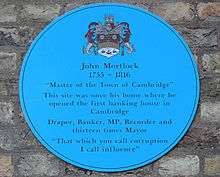John Mortlock

John Mortlock (1755–1816) was a British banker, Member of Parliament and 13 times mayor of Cambridge.
He was the only son of John Mortlock, a prosperous woollen draper of Cambridge.[1] He succeeded his father in 1777. His family seat was Abington Hall in Abington Magna outside Cambridge.
In 1778 Mortlock bought himself the Freedom of Cambridge for £40. Having originally followed his father as a woolen merchant he founded in 1780 the first bank in Cambridge, later one of the banks that founded Barclays Bank. In 1782 he became an alderman, then mayor and, in 1784, the Member of Parliament for Cambridge.[1]
Mortlock, who was a great friend and supporter of Pitt the Younger, was called corrupt by his political opponents, though as the plaque suggests he had a different view of things :"without influence, which you call corruption, men will not be induced to support government, though they generally approve of its measures"[2]
and :"his bitterest political opponents never impeached his business honesty".[2]
In 1792 he was appointed to the lucrative post of Receiver General of the Post Office, a post he held until 1806.[1]
He died in 1816. He had married Elizabeth, the daughter of grocer Stephen Harrison, and with her had eight sons and two daughters.[1] His grandson John Frederick Mortlock wrote an account of his transportation to Australia. His great-grandson, also John, was knighted. A grandson Frederick William Mortlock worked in customs in Jamaica
References
- 1 2 3 4 "MORTLOCK, John (1755-1816), of Cambridge and Pampisford, Cambs.". History of Parliament Online. Retrieved 2012-04-15.
- 1 2 Various Mortlock 2